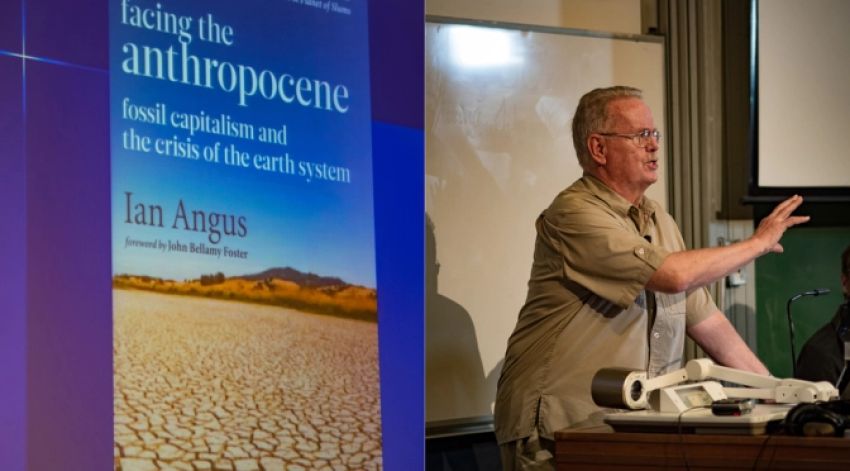
Facing the Anthropocene: Fossil Capitalism & the Crisis of the Earth System
By Ian Angus
Monthly Review Press
New York, 2016
We are living in a time of unparalleled ecological breakdowns and the crisis is much worse than most people realise. There are other books that tell this harrowing story, but Ian Angus's Facing the Anthropocene is different.
Yes, it urges us to face the reality of what is being done to our planet. Yet it insists we should also face up to the very real potential for human civilisation to survive it, provided we embark on a process of fundamental social change.
Earth System science is a relatively new discipline and marks a big change from past ways of looking at the planet. Angus explains: “Scientists have long studied various aspects of Earth, using methods of geology, biology, ecology, physics and other disciplines.
“Now many are studying Earth as an integrated planetary system — and discovering that human activity is rapidly changing that system in fundamental ways.”
Earth System scientists have found that human impact on this integrated planetary system has always been an insignificant factor — until now. Since the late 1980s, research into the Earth System by thousands of scientists has been coordinated by the International Geosphere-Biosphere Program (IGBP).
By 2001, so much evidence had mounted that a pamphlet from IGBP could say: “Humankind has begun to match and even exceed nature in terms of changing the biosphere and impacting other facets of Earth System functioning. The magnitude, spatial scale and pace of human-induced change are unprecedented.”
The IGBP said the changes were so vast it was now reasonable to say that the relatively stable geological era that covered all recorded human history — the Holocene — was over. Now “another geological epoch, the Anthropocene era … has begun”.
Strong evidence suggests that the Anthropocene began very recently. Angus explains that the IGBP's search for the origins of the Anthropocene revealed that human impacts on the Earth System had grown exponentially after World War II. They called this period “The Great Acceleration”.
They produced a series of 24 graphs that captured the trend. Carbon dioxide, ocean acidification, tropical forest loss and marine fish catches all rose steeply after 1950. So too did energy use, fertiliser use, water use and urbanisation.
Angus discusses those theorists who say the Anthropocene era really started thousands or even millions of years ago, but finds them lacking. Such “early Anthropocene” arguments can't explain, or just ignore, the striking rise in human impacts of the past 60 years.
Despite this, the early Anthropocene thesis is appealing to political conservatives: if the Anthropocene is nothing new, then it requires no urgent action in response.
The Planetary Boundaries analysis, first advanced by Earth Scientist Johan Rockstrom and his colleagues in 2009, gives added weight to the notion that the Earth has entered a volatile new geological era. The approach posits nine, closely linked planetary boundaries that are crucial for maintaining life as we know it.
Angus says that new research last year concluded that at least four of these boundaries have already crossed the safe threshold. These are climate change, the extinction rate, land use change, and nitrogen and phosphorus pollution (mostly from industrial farming).
Facing the Anthropocene gives special attention to the sheer scale of the climate crisis. With an average temperature rise of less than 1°C so far, the world's glaciers are retreating, the coral reefs are bleaching and rising seas are creating climate refugees. Unless carbon emissions are brought down to near zero very quickly, scientists think the average temperature rise will reach 4°C before the century ends.
Angus makes clear that “a 4°C world would not just be warmer: almost all the world will be thrust into a new climate regime”. A new climate regime implies not a gradual change but a wholesale shift from the past.
It would mean today's record-breaking temperatures would become the new normal, above which new extremes will rise. Much of the Earth's surface would simply be uninhabitable in a 4°C world.
Unlike many of the other recent books published about the Anthropocene, Angus's book devotes a lot of space to exploring the social and economic causes of the crisis. It also has a lot to offer on the kind of radical social and economic changes that could restore a sustainable human relationship with the rest of nature.
A problem as all-encompassing as disruptions to the Earth System will not be addressed by minor reforms. The prevailing capitalist system, with its compulsion to expand without limit and its obligation to place short term profit above all else, must be challenged.
Angus says: “Capitalism and fossil fuels have spectacularly expanded human health and wealth for two centuries. Now they are overwhelming the planetary processes that have made Earth hospitable to civilisation and our species for 10,000 years.” The Great Acceleration is the dreadful “culmination of two centuries of capitalist development”.
Yet Angus also has scant patience for radicals who end the argument there, scolding existing movements from the sidelines for being insufficiently anti-capitalist. Instead, he says ecosocialists should take part in environmental struggles wherever they arise, helping to bring as many people together as possible to resist environmental destruction.
After all, Angus asks, “if we can't stop a pipeline or prevent fracking or get a university to stop investing in the oil industry, how can we imagine that we're actually going to overthrow capitalism?”
Ian Angus has long been a major figure among those seeking to combine the best of Marxist theory and ecological science – a goal that Angus himself has often described as “making the greens redder and the reds greener”. With his newest offering he has advanced that goal tremendously. Over the past 15 years or so just a handful of the most impressive ecosocialist books have attained a “must-read” status. Add Facing the Anthropocene to that list.